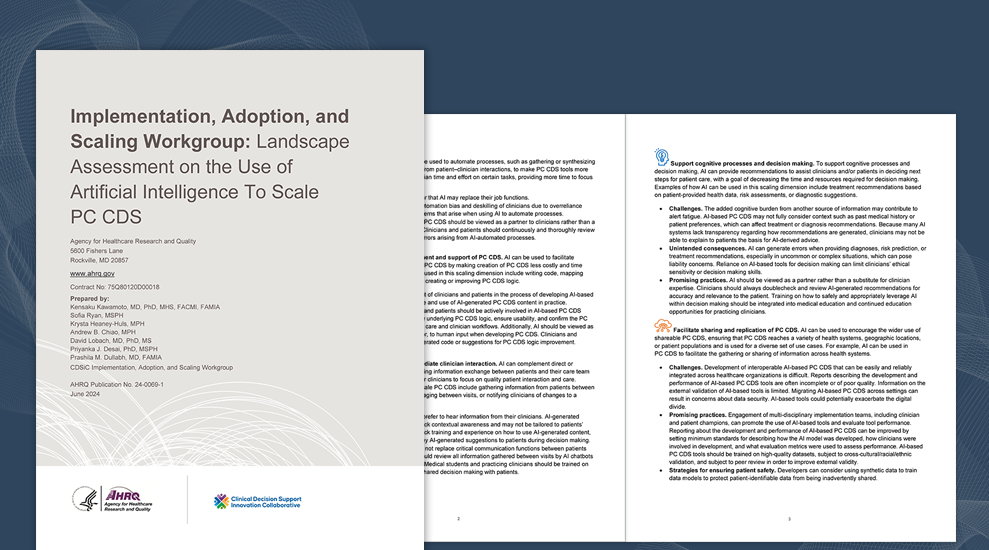
This report assesses use of artificial intelligence to scale patient-centered clinical decision support.
Developed by the AHRQ Clinical Decision Support Innovation Collaborative’s Implementation, Adoption, and Scaling Workgroup, this report provides an overview of current approaches for using artificial intelligence (AI) to scale patient-centered clinical decision support (PC CDS), outlines existing challenges, and highlights promising practices to ensure patient safety and privacy.
The adoption of patient-centered clinical decision support (PC CDS) remains relatively limited compared with its potential. While artificial intelligence (AI) has been used in clinical decision support to process and analyze large amounts of data to generate clinical recommendations, there has not been an exploration of how AI could be used to scale up implementation and adoption of PC CDS. This landscape assessment outlines key opportunities and considerations in this area, including recommendations for how to use AI to scale CDS in a patient-centered way. In addition, this landscape assessment presents illustrative use cases for how AI is currently being used to scale PC CDS. The assessment concludes with a discussion of the opportunities to advance the use of AI in PC CDS as well as a future research agenda and recommendations for addressing barriers to the use of AI to scale PC CDS.
About the Report
The landscape assessment was informed by a rapid analysis of systematic reviews related to CDS and AI, two discussions with CDSiC team members, and nine key informant interviews with health systems leaders, researchers, clinicians, industry representatives, and patient partners.
The report includes key findings related to the following PC CDS scaling dimensions:
- Automate processes,
- Facilitate technical development and support of PC CDS,
- Complement direct/immediate clinician interaction,
- Support cognitive processes and decision making, and
- Facilitate sharing and replication of PC CDS.
The report also includes cross-cutting considerations that apply across the above dimensions. The assessment concludes with opportunities for future research, including work in the areas of patient agency and clinical decision making.
How To Use This Report
The findings in this landscape assessment will enable PC CDS stakeholders to better understand and leverage AI to scale PC CDS more widely and encourage the use of AI in PC CDS among clinicians, patients, and their care teams.
A summary of findings for each scaling dimension is presented in the text box with a lightbulb icon at the beginning of each section. Readers can view these text boxes for the key points related to each scaling dimension and read the text that follows for more detail. Additionally, future directions for research related to each scaling dimension are presented in the text box with a map icon at the end of each section.
Suggested Citation: Kawamoto K, Ryan S, Heaney-Huls K, Chiao AB, Lobach D, Desai PJ, Dullabh PM, CDSiC Implementation, Adoption, and Scaling Workgroup. Implementation, Adoption, and Scaling Workgroup: Landscape Assessment on the Use of Artificial Intelligence to Scale PC CDS. Prepared under Contract No. 75Q80120D00018. AHRQ Publication No. 24-0069-1. Rockville, MD: Agency for Healthcare Research and Quality; June 2024.





